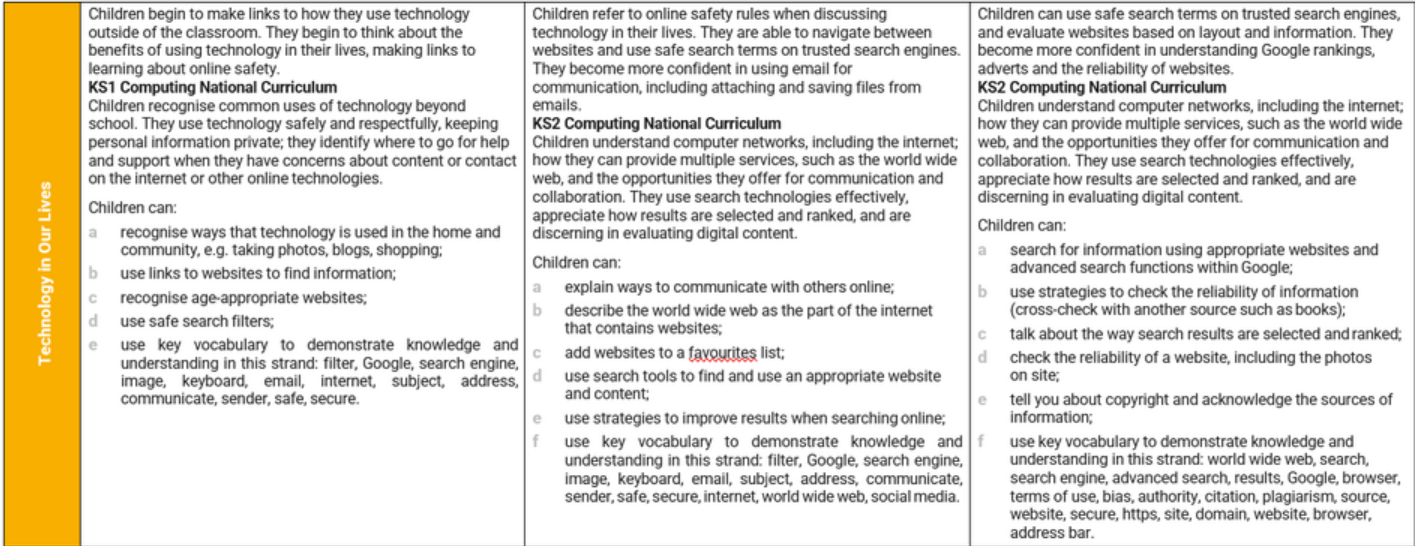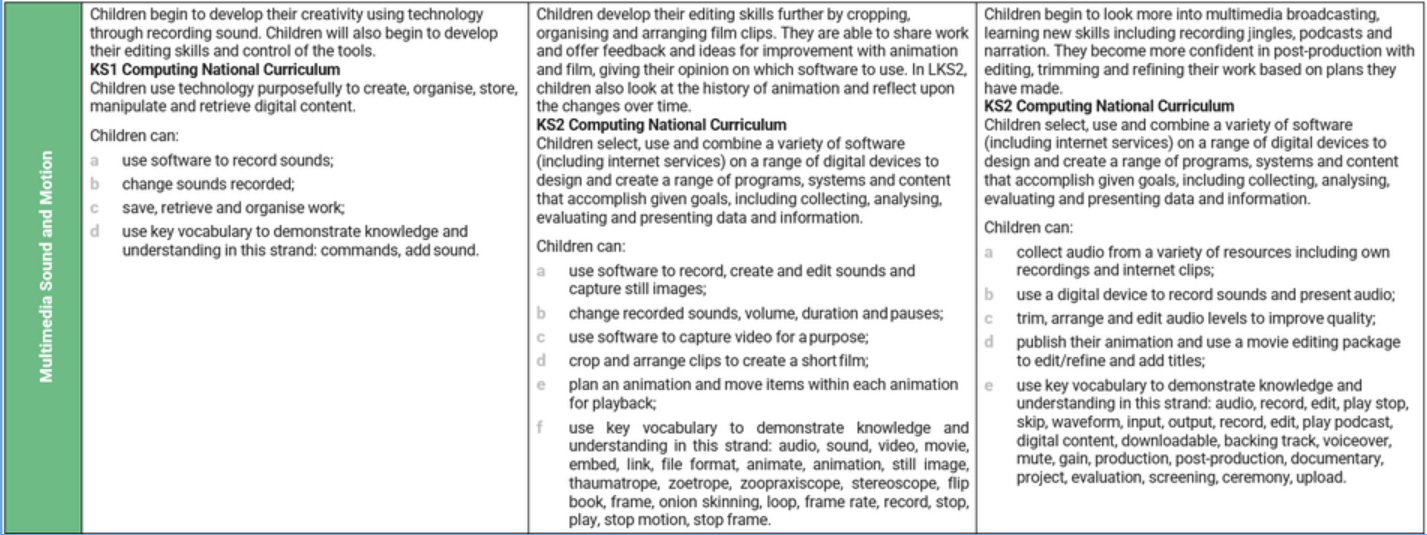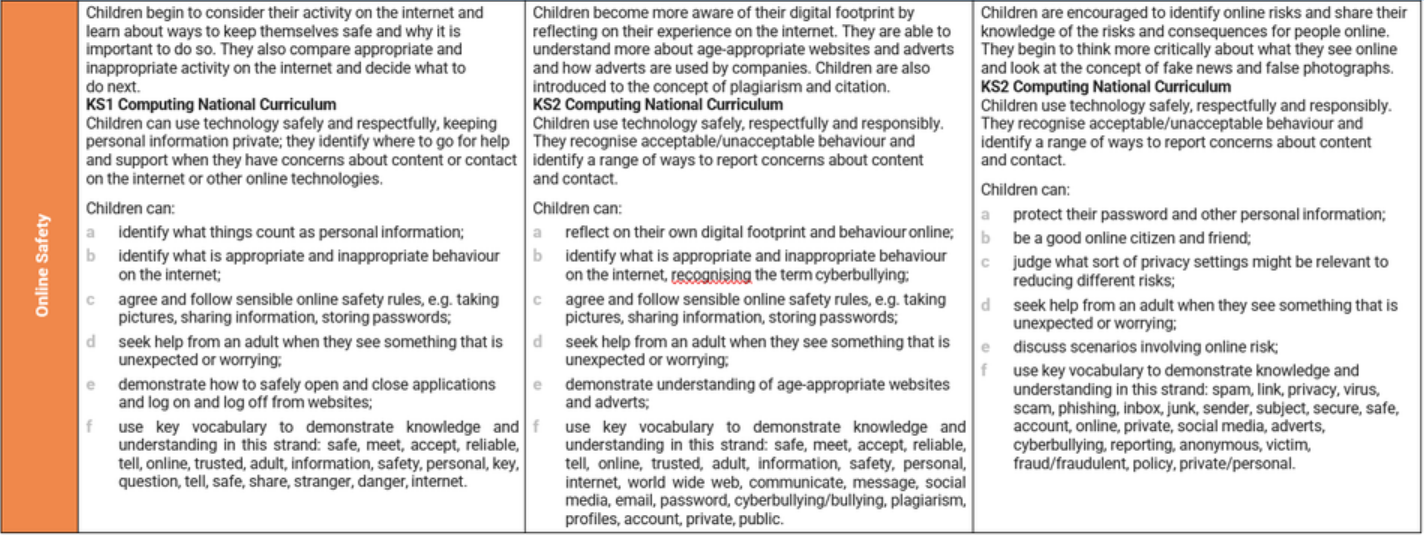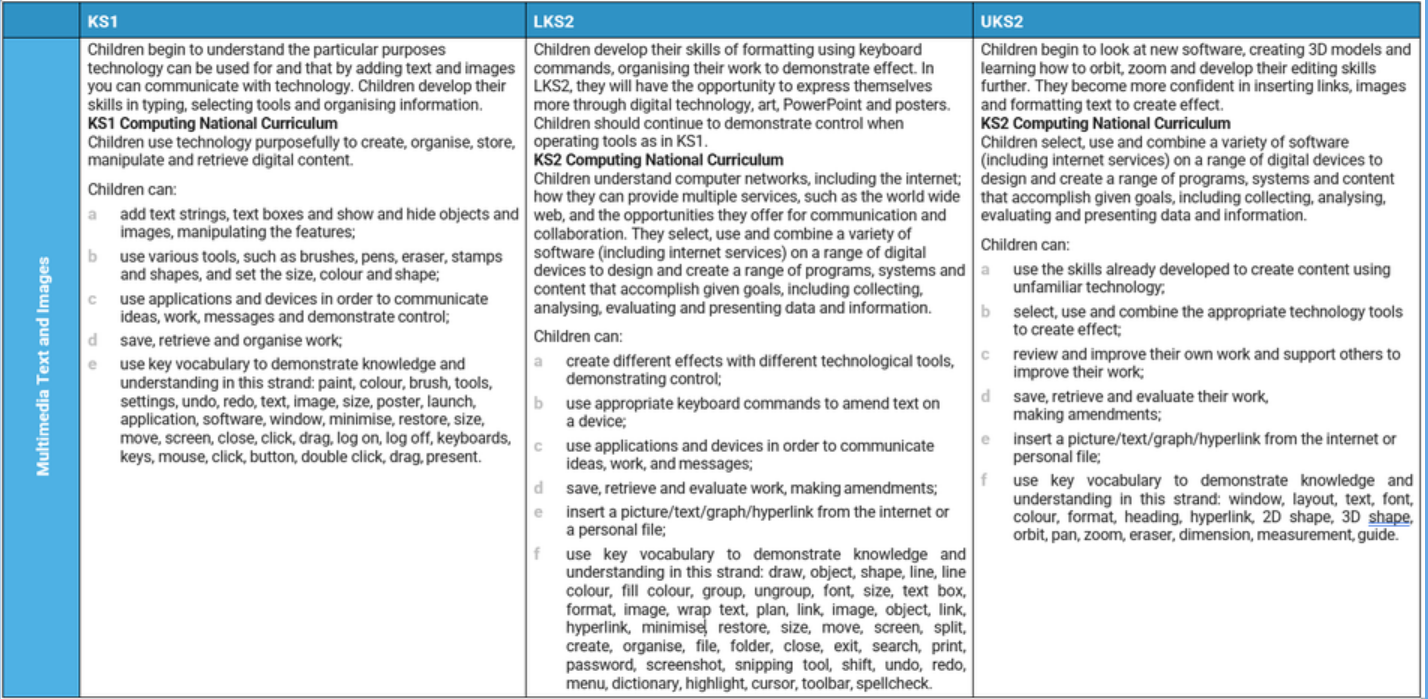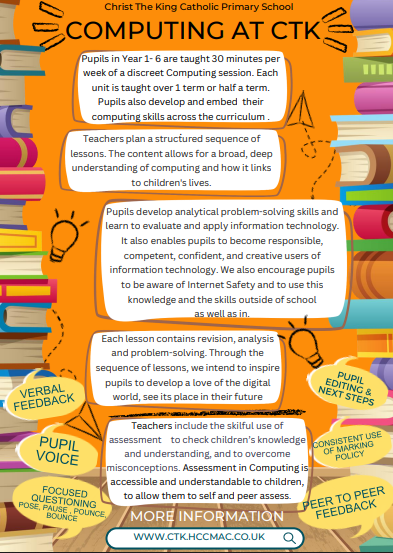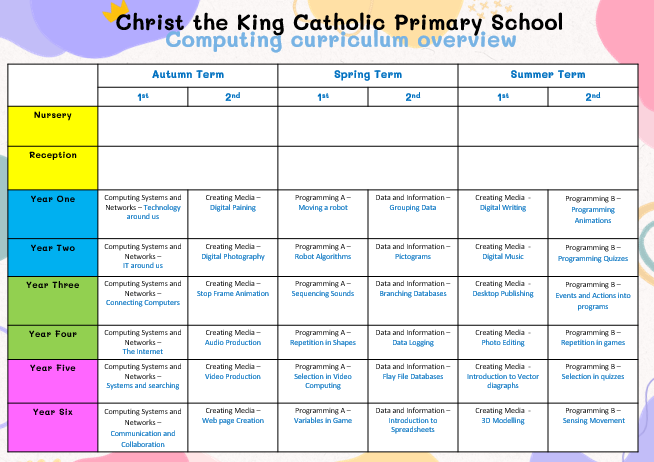Welcome to the Computing page!
Here at Christ the King we endeavour to inspire our pupils to become masters of technology. We know that technology is everywhere and we hope that all our pupils embed the lifelong skills needed for this subject. We want our pupils to be creators and use their computing skills across all subjects.
Computing at ctk
Overview of Curriculum
Intent Document
|
EYFS |
|
We have selected the Early Learning Goals that link most closely to the Computing National Curriculum. Understanding the World (Technology) Children recognise that a range of technology is used in places such as homes and schools. They select and use technology for particular purposes. The ‘Technology’ strand has been removed (2021), children will continue to be introduced to appropriate technology and use it within their learning. |
|
Key Stage One |
|
Pupils should be taught to:
|
|
Key Stage Two |
|
Pupils should be taught to:
use technology safely, respectfully and responsibly; recognise acceptable/unacceptable behaviour; identify a range of ways to report concerns about content and contact. |
|
Intent |
|
Technology is everywhere and it will play a pivotal role in our pupil’s lives, therefore at Christ the King we want to model how to use technology positively and safely. We offer a structured sequence of lessons, helping teachers to ensure that they have covered the skills required to meet the aims of the National Curriculum. The content allows for a broad, deep understanding of computing and how it links to children's lives. It offers a range of opportunities for consolidation, challenges, and variety. This allows children to apply the fundamental principles and concepts of computer science. They develop analytical problem-solving skills and learn to evaluate and apply information technology. It also enables them to become responsible, competent, confident, and creative users of information technology. We encourage the pupils to be aware of Internet Safety and to use this knowledge and the skills outside of school as well as in. This progression map supports computing subject leaders in readiness for an Ofsted ‘deep dive’. |
|
|
|
Each lesson contains revision, analysis and problem-solving. Through the sequence of lessons, we intend to inspire pupils to develop a love of the digital world, see its place in their future and give teachers’ confidence. Cross-curricular links are also important in supporting other areas of learning, Computing may not necessarily require an explicit weekly lesson, but Computing objectives can be covered when in other subjects. Our lesson plans and resources help children to build on prior knowledge at the same time as introducing new skills and challenges. In EYFS, children will have the opportunity to use technology to support their learning, for example, interactive boards, light boxes, tablets, etc. In KS1, the focus is on developing the use of algorithms, programming and how technology can be used safely and purposefully. In KS2, lessons still focus on algorithms, programming, and coding but in a more complex way and for different purposes. Children also develop their knowledge of computer networks, internet services and the safe and purposeful use of the internet and technology. Data Handling is featured more heavily in UKS2. Skills learnt through KS1 and LKS2 are used to support data presentation. Adult guides are offered, as well as end-of-unit assessments, enabling staff to feel confident in the progression of skills and knowledge and that outcomes have been met. An example of keywords has been included, showing the progression of specific language involved in children’s learning so that teachers can also assess understanding and progress through vocabulary. We suggest a specific sequence of lessons for each year group, offering structure and narrative. These are not to be used exclusively but will support teachers' planning. |
|
|
|
Learning in computing will be enjoyed across the school. Teachers will have high expectations and quality evidence will be presented in a variety of forms. Children will use digital and technological vocabulary accurately, alongside a progression in their technical skills. They will be confident using a range of hardware and software and will produce high-quality purposeful products. As practitioners we will constantly be asking the ‘why’ behind their learning and not just the ‘how’. Children will see the digital world as part of their world, extending beyond school, and understand that they have choices to make. They will be confident and respectful digital citizens going on to lead happy and healthy digital lives. |
Progression of Skills - EYFS
EYFS
The EYFS framework is structured very differently to the national curriculum as it is organised across seven areas of learning rather than subject areas. The aim of this document is to help subject leaders to understand how the skills taught across EYFS feed into national curriculum subjects. This document demonstrates which statements from the 2020 Development Matters are prerequisite skills for computing within the national curriculum. The table below outlines the most relevant statements taken from the Early Learning Goals in the EYFS statutory framework and the Development Matters age ranges for Three and Four-Year-Olds and Reception to match the programme of study for computing. The most relevant statements for computing are taken from the following areas of learning:
- Personal, Social and Emotional Development
- Physical Development
- Understanding the World
- Expressive Arts and Design
Computing Three and Four-Year-Olds
Personal, Social and Emotional Development
- Remember rules without needing an adult to remind them.
- Physical Development
- Match their developing physical skills to tasks and activities in the setting.
- Understanding the World
- Explore how things work.
Reception Personal, Social and Emotional Development
- Show resilience and perseverance in the face of a challenge.
- Know and talk about the different factors that support their overall health and wellbeing: -sensible amounts of ‘screen time’.
Physical Development
- Develop their small motor skills so that they can use a range of tools competently, safely and confidently.
Expressive Arts and Design
- Explore, use and refine a variety of artistic effects to express their ideas and feelings.
ELG Personal, Social and Emotional Development Managing Self
- Be confident to try new activities and show independence, resilience and perseverance in the face of challenges.
- Explain the reasons for rules, know right from wrong and try to behave accordingly.
Expressive Arts and Design Creating with Materials
- Safely use and explore a variety of materials, tools and techniques, experimenting with colour, design, texture, form and function.
Progression of Skills - KS1 and KS2

